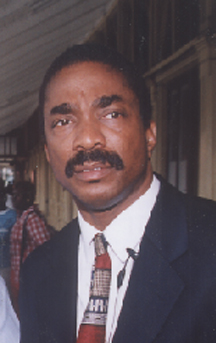APNU MP Basil Williams says the parliamentary review of the local government reform legislation should be completed within the next two weeks, and he has defended proposed amendments which will see a major change in the way the Local Government Commission is composed and in the hiring and dismissal of staff of local government organs.
Williams said the Fiscal Transfers Bill is all that remains for consideration by the Special Select Committee on Local Government, which was charged with reviewing four bills considered crucial ahead of long delayed polls.

On May 31, the committee considered both the Local Government Commission Bill and the Local Government (Amendment) Bill. It had earlier completed work on the Municipal and District Councils (Amendment) Bill.
Williams, who chairs the Committee, told Stabroek News that this Friday members will meet and any outstanding issues would be voted on in relation to the Fiscal Transfers Bill. He said that the next course of action is finalising the review process of the last bill and then bringing all four bills back to the National Assembly for debate and passage. He said that the faster the bills come into law, the faster local government elections can be run off.
“They had 12 years to do all this and they didn’t do a thing… they thought I would fail, but listen this had to be done. We moved these bills to special select committee and I cleared them in a matter of months,” he added.
On Monday, Local Government Minister Ganga Persaud accused the opposition of frustrating the work of the committee by revisiting contentious issues such as the composition of the Local Government Commission.
The original Local Government Commission Bill in effect allowed government to select all six members of the Commission. However, in the committee the opposition parties have voted to amend the selection clause and Williams said the Commission would comprise three members from the government, three from the opposition and one person from one of the trade unions.
The opposition parties had objected to Clause 4 (1) of the original Bill which stated that the Commission shall have six members; three to be appointed by the President, in accordance with his own deliberate judgment; two to be appointed by the President after he has consulted with the Opposition Leader; and one other member appointed by the Local Government Minister after he has consulted with local democratic organs.
Williams explained that to prevent confusion and further bureaucracy, the Commission had to comprise of government, opposition and a person without a political affiliation. He stated that having the ministry playing such a controlling role severely diminishes the autonomy of the RDCs.
Moreover, Williams said that with the establishment of the Local Government Commission, the responsibility for hiring and dismissal of local organ workers would be removed from the Local Government Minister to the Commission, to avoid contention between the minister and the Region Democratic Councils (RDCs). He clarified that the set-up of the Commission will not interfere with the appointment of RDC representatives as they are elected officials, but hired staff, such as clerks and Regional Executive Officers (REOs) would fall under its purview. “The government didn’t want that. They wanted the minister to still have that power, but we voted that down. The Commission needs to have that authority not the ministry,” he explained.
Williams noted that many of the changes to the Local Commission Bill have set up the foundation for the actual establishment of the Commission. He said that the current standoff between the minister and Region Four over the REO would not be so contentious when the Commission is established and fully functioning. Williams said that “it is very telling [that] the minister is going against the wishes of elected parties, people that were elected by the people.”
He added that while the ministry is responsible for the hiring of the REO, it meant that the central government could exercise greater control over the functioning of RDCs, therefore sidestepping the purpose of the elected members of the council. He said that the dismissal of the REO, Deolall Rooplall, by the RDC should be respected as the council has a responsibility to dismiss persons it believes are hindering work at the municipal level.
After the RDC voted to remove Rooplall, Region Four Chairman Clement Corlette was told on Monday by Persaud that he would not be standing behind the decision. Persaud on Monday stated that Corlette did not understand the functions of the REO and the various reasons for which Rooplall was dismissed made little sense as the REO was in fact acting within the ambit of his job description.
When Stabroek News contacted Rooplall, he said he was not allowed to speak with the media and any questions had to go through the Permanent Secretary of the ministry. Rooplall has however spoken to sections of the media.
Corlette stated that the RDC respects the minister’s decision but voiced his disagreement, saying that he had hoped Persaud would have approved the dismissal. Corlette noted previously that the elected members of the council had given Rooplall a warning because of his continued refusal to carry out the works of the RDC back in February. After three months of probation and not seeing any improvement, the RDC made the decision to dismiss Rooplall and sought the minister’s approval, which was denied on Monday.





